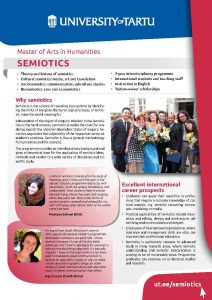International Master’s Programme of Semiotics at the University of Tartu
Dear colleagues,
Master Studies in Semiotics at the University of Tartu
The 2-year Master’s programme in Semiotics provides interdisciplinary background and gives a theoretical base for application of semiotic ideas to a wide variety of disciplines and scientific study. The programme binds together the theory of semiotics and three core modules – cultural semiotics, biosemiotics and sociosemiotics. The programme also combines the major semiotic traditions of Ferdinand de Saussure and Charles S. Peirce with the leading contemporary and innovative thought.
Tuition-waiver scholarships are available.
University of Tartu is home to a unique center of semiotics, as the Department of Semiotics established by Juri Lotman is one of the oldest in the world. It has long- time traditions in research and teaching semiotics at BA, MA, and PhD levels.
In the 2009/2010 academic year, we launched an international English MA programme in Semiotics. Since then, we have had eight successful application rounds to the programme. Several of the alumni continue their studies at PhD level in our department. Students from all over the world have participated in the programme (USA, Brazil, Mexico, Greece, Taiwan, Indonesia, Turkey, Italy, Latvia, Russia, to name a few), creating a vibrant international setting for fruitful semiotic discussions. In addition to the various specialists in semiotics in our own department, lecturers from other semiotic centers visit us on a regular basis.
The MA programme offers a series of courses that cover the historical, theoretical and applied aspects of semiotic knowledge. The programme includes three main fields of semiotics – semiotics of culture, bio- and sociosemiotics, while also providing an insight into the methodology and contemporary applications of semiotic analysis. The various courses from the basic module give an overview of the historical and current theoretical problems, basic concepts and tendencies in semiotics. The module also focuses on the history and theoretical texts of the Tartu–Moscow School and works by J. Lotman and J. von Uexküll in order to stress the traditions, importance and position of Estonia in the history of semiotic thought. Students will learn the main (qualitative) methods of semiotic analysis and their possibilities of application in the interpretation of modern cultural phenomena.
The Semiotics of Culture module deepens the students’ knowledge of cooperation of cultural semiotics with other disciplines, and focuses on understanding the key concepts of cultural research. The other two courses in this module are more practical, discussing translation and transfer processes in culture, and teaching students to analyse various performative and artistic events with semiotic tools. The Biosemiotics module is dedicated to a thorough understanding of relations between nature and culture, environmental studies, the works of several predecessors of biosemiotics and human-animal communication, and communication of various species. The Sociosemiotics module adds another layer to the interdisciplinary education, focusing on various social processes, relations between society and culture, semiotic competence, development of subcultures, the influence of ideology in communication processes, and the central problems of political semiotics and discourse analysis.
The programme does not require previous studies in semiotics; students from different fields of study are welcome to apply. Tuition-waiver scholarships are available. The online application form can be accessed at: https://estonia.dreamapply.com/courses/course/18-ma-semiotics The application system opens on January 2, 2017 and the deadline is March 15, 2017, by which time all the required documents have to be sent to the University of Tartu.
More information and admission requirements can be found at:
http://www.flfi.ut.ee/en/department-semiotics/masters-studies Please find attached the brochure of our programme.
Please share the information with all your students and colleagues who might be interested, and encourage them to visit our website and ask for further information.
Please feel free to contact us for questions, comments, inquiries, and applications!
Yours truly,
Liina Sieberk, programme coordinator
Elin Sütiste, programme manager
E-mail: tartusemiotics@ut.ee Phone: +372 737 5933
Department of Semiotics University of Tartu Estonia


Leave a Reply